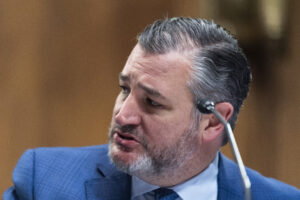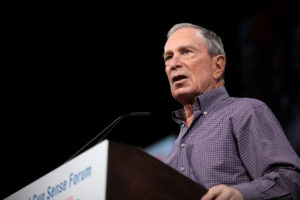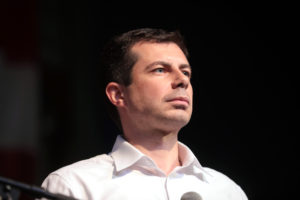So Much for Democrats’ Pledge to Reject Corporate PACs
It’s a sharp contrast to the promises they’ve made during their campaigns. Senate candidate Mark Kelly, center, and his wife, former Arizona Rep. Gabby Giffords, talk with former Secretary of Defense Leon Panetta. (MC1 Chad J. McNeeley / Wikimedia Commons)
Senate candidate Mark Kelly, center, and his wife, former Arizona Rep. Gabby Giffords, talk with former Secretary of Defense Leon Panetta. (MC1 Chad J. McNeeley / Wikimedia Commons)
Before the 2018 midterm elections, and now, in the 2020 presidential campaign, multiple Democratic presidential and congressional candidates have publicly sworn off taking money from corporate political action committees. For Beto O’Rourke, denouncing PAC money didn’t hurt his fundraising bottom line. In fact, it may have been an advantage—he raised more money in the first 24 hours after his announcement than any other candidate in the race. But similar anti-PAC pronouncements may have been less beneficial for Massachusetts Sen. Elizabeth Warren, whom The New York Times suggests potentially lost funding.
Some Democratic House members seem to have found a strategy for having it both ways, rejecting money from corporate PACs but accepting checks from corporate lobbyists, Politico reported Tuesday.
Gil Cisneros, D-Calif., made an anti-PAC money promise during his 2018 campaign, which Politico writer Theodoric Meyer called “a clear way to distinguish himself from his Republican rival,” Young Kim, who took donations from Chevron, ExxonMobil and Koch Industries.
But six months after Cisneros won the election, Meyer reports that he’s not quite honoring his pledge:
Four lobbyists — who represent major corporate clients including AT&T, Comcast, Microsoft, Pfizer, Verizon and Wells Fargo — hosted a fundraiser for Cisneros late last month at a townhouse on Capitol Hill, according to a Democratic Congressional Campaign Committee list of fundraisers obtained by POLITICO.
The lunchtime fundraiser, hosted by Ingrid Duran and Catherine Pino of D&P Creative Solutions and Dean Aguillen and Moses Mercado of Ogilvy Government Relations, brought in about $15,000 for Cisneros’ reelection campaign, according to a person familiar with the total.
Rejecting corporate PAC money has become a litmus test for progressive candidates. “People are concerned that corporate special interests have too much power in Washington,” Adam Bozzi, communications director of End Citizens United, an advocacy group that fights money in politics, told CNN in 2018. “This is a way that candidates can take a leadership role and say: ‘I’m not taking their money. I’m going to work for you.’ ”
Cisneros’ event wasn’t a direct violation of his pledge—the money was raised not from corporate PACs themselves, but from personal checks from lobbyists who represent those same corporations. It’s a distinction that multiple Democrats have made. Meyer points out that “two of the lobbyists who hosted the Cisneros fundraiser also hosted one last month for Rep. Xochitl Torres Small (D-N.M.), another freshman who’s sworn off corporate PAC money, according to an invitation obtained by POLITICO.”
Rep. Cindy Axne, D-Iowa, made a similar move, with a fundraiser hosted at Cornerstone Government Affairs, a lobbying firm that represents Boeing, Citigroup, Johnson & Johnson, Nike and United Airlines. Mike Goodman, a Cornerstone senior vice president, wrote in an email statement to Politico that “Rep. Axne does not take corporate PAC donations, but we are still very hopeful that our friends will show up to help in whatever capacity they can.”
Senate candidate Mark Kelly, retired astronaut and husband of former Arizona Rep. Gabby Giffords, also held a fundraiser in a lobbying firm’s offices, in his case, the offices of Capitol Counsel, whose clients include ExxonMobil, JPMorgan Chase and Lockheed Martin. Kelly’s campaign website states, “I won’t take a dime of corporate PAC money, and I’ll only answer to Arizonans.”
At least one Democrat defended the distinction. Rep. Tom Malinowski, D-N.J., told Politico, “I’ve never thought that the lobbyist definition was particularly meaningful.” He explained that even if he doesn’t take their money, he’s still willing to meet with lobbyists. “I just want to be able to evaluate their requests on the merits,” he said.
Read Politico’s full story here.
Your support matters…Independent journalism is under threat and overshadowed by heavily funded mainstream media.
You can help level the playing field. Become a member.
Your tax-deductible contribution keeps us digging beneath the headlines to give you thought-provoking, investigative reporting and analysis that unearths what's really happening- without compromise.
Give today to support our courageous, independent journalists.






You need to be a supporter to comment.
There are currently no responses to this article.
Be the first to respond.